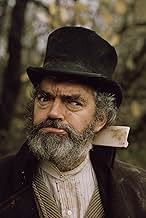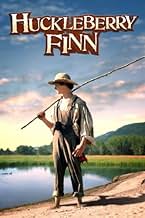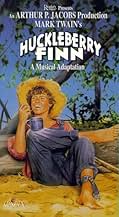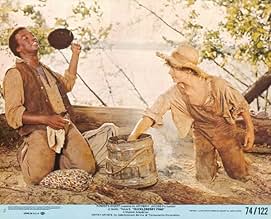Agrega una trama en tu idiomaIn 1840s Missouri, young Huckleberry Finn, wanting to escape his violent drunkard father, joins Black runaway slave Jim on a quest for freedom down the Mississippi River on a raft.In 1840s Missouri, young Huckleberry Finn, wanting to escape his violent drunkard father, joins Black runaway slave Jim on a quest for freedom down the Mississippi River on a raft.In 1840s Missouri, young Huckleberry Finn, wanting to escape his violent drunkard father, joins Black runaway slave Jim on a quest for freedom down the Mississippi River on a raft.
- Dirección
- Guionistas
- Elenco
- Dirección
- Guionistas
- Todo el elenco y el equipo
- Producción, taquilla y más en IMDbPro
Opiniones destacadas
A forgotten relic from the early '70s, when shows like "Little House on the Prairie" and "The Waltons" all reflected our yearning for a so-called simpler, less complicated era. This adaptation, while not entirely faithful to the book, captures its essential themes and spirit rather well. There are some technical problems (the lighting always seem to be half in shadow, whether it's night or day!) and its kiddie-friendly tone seems at odds during the Grangerfords/Shepherdsons sequence, wherein we see men being shot and killed right on camera--and it's handled rather lightly. Parents should also be warned that this adaptation does have some strong language--it has not been sanitized, notwithstanding its G rating.
In addition, the musical format sits much more uneasily with this movie than with the superior "Tom Sawyer" (from the year before, with many of the same cast members and production staff). However, as oddly as some numbers come off, others are wonderful, such as the clever, dixie-ish "Cairo, Illinois," a duet between Huck and Jim that kicks off their great journey together. The jaunty title song and the lovely anthem "Freedom" also showcase the movie and its themes beautifully--especially during "Freedom"'s reprise, as Huck, the boy/man run away, gazes after Jim making his way downriver. Performances are generally strong--Jeff East could've been a better singer but his performance is so sincere and authentic, you hardly notice. Likewise his bond with Jim (well-portrayed by the late Paul Winfield) comes through nicely, most especially in their final, very moving scene together. Harvey Korman and David Wayne also deliver terrific turns as the King and the Duke, respectively.
Cinematography is *gorgeous*--the DP took full advantage of the location shoot, with some beautiful silhouette shots. Although its prequel is far better (you simply cannot top "Tom Sawyer"'s terrific score and thoroughbred cast), Mark Twain's quintessential Great American novel is reasonably well-served here, if not transcendently.
In addition, the musical format sits much more uneasily with this movie than with the superior "Tom Sawyer" (from the year before, with many of the same cast members and production staff). However, as oddly as some numbers come off, others are wonderful, such as the clever, dixie-ish "Cairo, Illinois," a duet between Huck and Jim that kicks off their great journey together. The jaunty title song and the lovely anthem "Freedom" also showcase the movie and its themes beautifully--especially during "Freedom"'s reprise, as Huck, the boy/man run away, gazes after Jim making his way downriver. Performances are generally strong--Jeff East could've been a better singer but his performance is so sincere and authentic, you hardly notice. Likewise his bond with Jim (well-portrayed by the late Paul Winfield) comes through nicely, most especially in their final, very moving scene together. Harvey Korman and David Wayne also deliver terrific turns as the King and the Duke, respectively.
Cinematography is *gorgeous*--the DP took full advantage of the location shoot, with some beautiful silhouette shots. Although its prequel is far better (you simply cannot top "Tom Sawyer"'s terrific score and thoroughbred cast), Mark Twain's quintessential Great American novel is reasonably well-served here, if not transcendently.
Unnecessary and unsatisfying musical rendering of Mark Twain's classic "Adventures of Huckleberry Finn". At least, it captures the genuine friendship between Jeff East (as Huckleberry Finn) and Paul Winfield (as Jim). However, these two performers are much more likable in other projects. Interestingly, Mr. East portrayed "Huck" in 1973's similarly presented re-make of "Tom Sawyer", which was considered the better film. In my opinion, East would have been a better "Tom" than "Huck". Some of the photography is rather nice, especially during the more moody ending. The Sherman-Sherman musical numbers are well below standard. The movie doesn't seem much like the book. Roberta Flack sings "Freedom" to end it all, at last.
*** Huckleberry Finn (1974) J. Lee Thompson ~ Jeff East, Paul Winfield, Harvey Korman
*** Huckleberry Finn (1974) J. Lee Thompson ~ Jeff East, Paul Winfield, Harvey Korman
Mark Twain purists might take issue with the changes made in the story of the
classic Huckleberry Finn. But I rather like the approach that was taken here and also the performance of Jeff East in the title role.
This was East's second film, he debuted the previous year in Tom Sawyer also playing Huck Finn. Later on he would be young Clark Kent in the blockbuster Superman film.
Harvey Korman and David Wayne are nothing short of brilliant as those two rogues the 'king' and the 'duke'. Both look like they are having a great old time. Gary Merrill is superb as Huck Finn's white trash Pap.
In this post civil rights era film particular emphasis is placed on Huck's relationship with runaway slave Jim with whom he shares that raft on the Mississppi. The optimism of Twain's work stems from the white trash background that Huck has, but that how he thinks and reasons and generally tries to rise above it. Some very good scenes are shared with East and with Paul Winfield as Jim.
The Sherman Brothers musical score is serviceable for the film, but nothing outstanding. The sets and cinematography really do convey life in the ante bellum souh and border states.
You can't go wrong with this adaption of Huckleberry Finn.
This was East's second film, he debuted the previous year in Tom Sawyer also playing Huck Finn. Later on he would be young Clark Kent in the blockbuster Superman film.
Harvey Korman and David Wayne are nothing short of brilliant as those two rogues the 'king' and the 'duke'. Both look like they are having a great old time. Gary Merrill is superb as Huck Finn's white trash Pap.
In this post civil rights era film particular emphasis is placed on Huck's relationship with runaway slave Jim with whom he shares that raft on the Mississppi. The optimism of Twain's work stems from the white trash background that Huck has, but that how he thinks and reasons and generally tries to rise above it. Some very good scenes are shared with East and with Paul Winfield as Jim.
The Sherman Brothers musical score is serviceable for the film, but nothing outstanding. The sets and cinematography really do convey life in the ante bellum souh and border states.
You can't go wrong with this adaption of Huckleberry Finn.
I'm back to deliver another commentary after reading the book. Like the book, I couldn't wait for the movie to be done. I thought the ending got smoothed out a little bit, but it was a "musical adaptation" of the story, so if you wanted the mess that was the ending of the book, this isn't the place to look for it.
Speaking of which, I'd love to see a musical movie of Big River, which is the 80s musical version of the book. It has fabulous music, and while it also smooths out the ending, the music more than makes up for it.
The most enjoyable part of the movie was seeing Harvey Korman's The King. I was secretly hoping that Tim Conway would end up being The Duke, and that would have been awesome. But he was great, as he always was on Carol Burnett and other roles.
Speaking of which, I'd love to see a musical movie of Big River, which is the 80s musical version of the book. It has fabulous music, and while it also smooths out the ending, the music more than makes up for it.
The most enjoyable part of the movie was seeing Harvey Korman's The King. I was secretly hoping that Tim Conway would end up being The Duke, and that would have been awesome. But he was great, as he always was on Carol Burnett and other roles.
Talented filmmaker J. Lee Thompson stages this musical version of Mark Twain's "The Adventures of Huckleberry Finn" with artificial verve, and nothing in it looks quite right or plays at the appropriate tempo. Stolen from his guardians by his delinquent father, Huckleberry Finn stages his own death and hits the Mississippi River with friend Jim the Slave (why the two don't return to the sisters whom Jim works for is never made clear--both he and Huckleberry would certainly benefit from their generosity). Songwriters Richard and Robert Sherman, who also adapted the screenplay, seemed to lose their way musically once their mentor, Walt Disney, died; here, their songs are like leaden chapter stops in the narrative, not that the actors have much musical range. Teen star Jeff East doesn't even have music in his speaking voice, and he crawls through the picture lethargically, talking through his nose as if he had a cold. Paul Winfield fares better as Jim, though this pictorial, phony journey must have seemed quite a comedown after his "Sounder". Cinematographer László Kovács gets some beautiful shots of the raft on the water, but the limp direction and editing makes nearly all of Kovács' compositions look poorly framed. The color schemes are gloppy, with day scenes appearing as dusk and vice-versa. Director Thompson, who makes the white folks look like doddering scoundrels and the black folks look like grinning simpletons, can't work up a cohesive pace for the picture, and it jostles about from one poor vignette to the next. This was a follow-up by financiers Reader's Digest to 1973's "Tom Sawyer"; as with that film, a TV-version was right on their heels, in this case 1975's "Huckleberry Finn" starring Ron Howard and Donny Most. * from ****
¿Sabías que…?
- TriviaThis was the first musicalization of Huckleberry Finn. The next one happened 10 years later in 1985, on Broadway; it was "Big River." a hit show which ran for several years and won seven Tonys, including Best Musical.
- Citas
Huckleberry Finn: I don't give a damn what the whole world says, 'cause if I'm doin' wrong--well--well, I hope I roast in hell forever.
- ConexionesFollows Tom Sawyer (1973)
Selecciones populares
Inicia sesión para calificar y agrega a la lista de videos para obtener recomendaciones personalizadas
- How long is Huckleberry Finn?Con tecnología de Alexa
Detalles
- Fecha de lanzamiento
- País de origen
- Sitio oficial
- Idioma
- También se conoce como
- Mark Twain's Huckleberry Finn: A Musical Adaptation
- Locaciones de filmación
- Productoras
- Ver más créditos de la compañía en IMDbPro
Taquilla
- Presupuesto
- USD 3,000,000 (estimado)
- Tiempo de ejecución1 hora 58 minutos
- Color
- Relación de aspecto
- 2.35 : 1
Contribuir a esta página
Sugiere una edición o agrega el contenido que falta

Principales brechas de datos
By what name was Huckleberry Finn (1974) officially released in India in English?
Responda





























